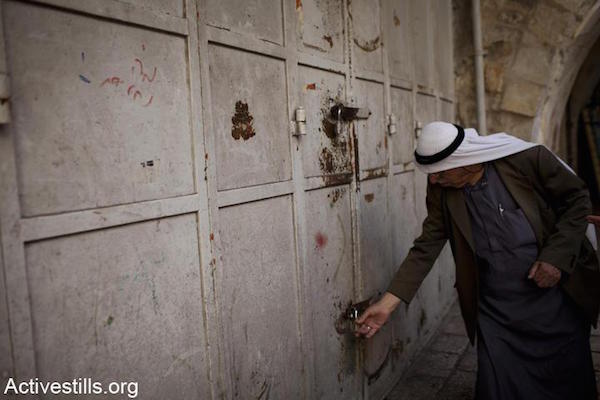High Court dismisses petition to re-route the ‘Jerusalem Day’ march away from the Muslim Quarter, but tells police it expects them to act against the type of racist incitement for which the ‘March of the Flags’ is notorious.

Two Jerusalem-based NGOs on Monday lost a legal battle to keep Israel’s hyper-nationalist, racist and often violent “March of the Flags” Jerusalem Day procession from passing through the Muslim Quarter of the Old City later this week.
The High Court, while dismissing a petition by Ir Amim and Tag Meir, did tell police that it expects them to arrest and press charges against participants who make racist and inciting chants, like “death to Arabs,” which have become a staple of the annual march.
“Anyone who says ‘death to Arabs,’ we are of the opinion that he must be punished, and the police needs to have the same understanding,” Justice Rubinstein said in the hearing on Monday. “This is not freedom of speech but the freedom to incite.”
The NGOs launched a campaign earlier this month to try and stop the march from passing through the Muslim Quarter. Each year, while permitting the nationalist march to proceed, police ban Palestinian residents from their own streets outside their homes and businesses — ostensibly in order to protect them from “March of the Flags” participants.
In a letter sent to Israeli authorities, the NGOs noted that public events like marathons and cycle races limit freedom of movement throughout the city all year long. The difference between those events, however, is that on Jerusalem Day freedom of movement is decided by one’s ethnicity and nationality, not participation in a marathon or bicycle race.
Palestinian shopkeepers are told to shutter their stalls and stores ahead of the march
“Restricting freedom of movement solely on an ethnic-national basis is not acceptable in a democratic state,” Attorney Eitay Mack wrote on behalf of the organizations.

Most of the arrests on Jerusalem Day in recent years have been of Palestinians protesting the march, and police have assaulted and detained Israeli and Palestinian journalists covering those events. This year, activists are planning to film the march with an aim at documenting whether police heed the High Court’s warning and arrest Jews making racist and inciting chants.
Jerusalem Day is billed as a celebration of the city’s “reunification” in 1967. In practice, it is a day for Israeli nationalists, draped in flags, dancing in circles, singing and chanting “death to Arabs” as they march through East Jerusalem and the Old City. Many of the Jewish demonstrators are bused in from right-wing yeshivas in Israel and the West Bank.
The international community does not recognize Israel’s annexation of East Jerusalem, including the Old City. And although Israel annexed the territory and included it in the municipal boundaries of Jerusalem, its residents were not granted citizenship; they hold permanent residency, which can be revoked for any number of reasons, often at the discretion of the Israeli interior minister.
Israel has revoked the residency 14,416 East Jerusalem Palestinians since it seized control of the territory in the 1967 Six Day War, which rights groups have termed a policy of quiet deportation. In 2014, it revoked the residency of 107 East Jerusalem Palestinians, including 56 women and 12 minors, according to information provided to and published by Hamoked — Center for Defence of the Individual.
Additionally, as Israel has built its concrete separation barrier in the Jerusalem area, it deliberately left Palestinian neighborhoods of East Jerusalem on the West Bank side of the wall. Those neighborhoods have systematically been denied basic social and municipal services, ranging from trash collection, policing and mail delivery to, in the most extreme cases, running water.
In recent years, Jewish settlers have intensified their push into Palestinian neighborhoods, with a renewed push taking place in Sheikh Jarrah, Silwan and the Muslim Quarter of the Old City.


